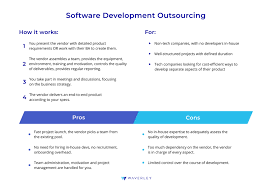Maximizing Efficiency: The Benefits of Outsourcing Java Development
The Benefits of Outsourcing Java Development
Java is a versatile and powerful programming language that is widely used for developing a variety of applications, from web and mobile apps to enterprise software. Outsourcing Java development has become a popular choice for many businesses looking to leverage the expertise of skilled professionals while reducing costs and improving efficiency.
Cost-Effectiveness
One of the primary reasons companies choose to outsource Java development is cost-effectiveness. By outsourcing, businesses can access a global talent pool of experienced Java developers at a fraction of the cost compared to hiring in-house staff. This cost savings can be significant, especially for smaller companies or startups with limited budgets.
Access to Skilled Professionals
Outsourcing Java development allows businesses to tap into the expertise of skilled professionals who specialize in Java programming. These professionals are well-versed in best practices, coding standards, and the latest technologies related to Java development. By outsourcing, businesses can benefit from this specialized knowledge and experience without having to invest in extensive training or recruitment efforts.
Faster Time-to-Market
Outsourcing Java development can help accelerate the development process and bring products to market faster. With a dedicated team of experienced developers working on your project, you can expect quicker turnaround times and efficient delivery of high-quality software solutions. This speed-to-market advantage can give your business a competitive edge in today’s fast-paced digital landscape.
Focus on Core Business Activities
By outsourcing Java development, businesses can free up internal resources and focus on core business activities. Instead of getting bogged down in technical details and coding tasks, companies can delegate their software development needs to external experts while concentrating on strategic initiatives that drive growth and innovation.
Risk Mitigation
Outsourcing Java development also helps mitigate risks associated with software projects. Experienced outsourcing providers have established processes and quality assurance measures in place to ensure project success and minimize potential risks such as delays, budget overruns, or technical issues. This risk mitigation factor provides peace of mind for businesses seeking reliable and predictable outcomes from their software development projects.
In conclusion, outsourcing Java development offers numerous benefits for businesses looking to streamline their software development processes, reduce costs, access specialized expertise, and accelerate time-to-market. By partnering with reputable outsourcing providers, companies can harness the power of Java programming while focusing on their core business objectives.
7 Essential Tips for Successfully Outsourcing Java Development Projects
- Clearly define your project requirements and expectations before outsourcing.
- Research and choose a reputable outsourcing company with experience in Java development.
- Communicate effectively with the outsourced team to ensure they understand your needs.
- Set milestones and deadlines to track progress and ensure timely delivery of the project.
- Protect your intellectual property by signing a non-disclosure agreement with the outsourcing partner.
- Regularly review the code quality and provide feedback for improvements during the development process.
- Consider factors like time zone differences, cultural nuances, and language barriers when working with an outsourced team.
Clearly define your project requirements and expectations before outsourcing.
It is crucial to clearly define your project requirements and expectations before outsourcing Java development. By establishing a detailed scope of work, desired outcomes, timelines, and quality standards upfront, you can ensure that both you and the outsourcing partner are aligned on the project goals. Clear communication of expectations helps prevent misunderstandings, reduces the risk of scope creep, and enables the outsourcing team to deliver results that meet your specific needs efficiently. Taking the time to articulate your project requirements upfront sets a solid foundation for a successful collaboration and ensures that the outsourced Java development project progresses smoothly towards achieving your desired objectives.
Research and choose a reputable outsourcing company with experience in Java development.
When considering outsourcing Java development, it is crucial to research and select a reputable outsourcing company with a proven track record in Java development. Choosing an experienced partner ensures that your project will be in capable hands, with professionals who understand the intricacies of Java programming and can deliver high-quality solutions. By partnering with a reputable outsourcing company, you can have confidence in the expertise and reliability of the team working on your Java development project, ultimately leading to successful outcomes and efficient software delivery.
Communicate effectively with the outsourced team to ensure they understand your needs.
Effective communication is key when outsourcing Java development to ensure that the outsourced team fully understands your needs and requirements. By maintaining clear and open lines of communication, you can avoid misunderstandings, clarify expectations, and provide timely feedback throughout the development process. Regular updates, progress reports, and feedback sessions help foster a collaborative working relationship with the outsourced team, ultimately leading to successful project outcomes that align with your business goals.
Set milestones and deadlines to track progress and ensure timely delivery of the project.
Setting milestones and deadlines is a crucial tip when outsourcing Java development. By establishing clear checkpoints and timelines, businesses can effectively track the progress of the project and ensure that it stays on schedule for timely delivery. This approach not only helps in monitoring the development process but also enables both the outsourcing team and the client to stay aligned on expectations and goals. Setting milestones and deadlines promotes accountability, motivates team members to stay focused, and ultimately leads to successful project completion within the specified timeframe.
Protect your intellectual property by signing a non-disclosure agreement with the outsourcing partner.
To safeguard your intellectual property when outsourcing Java development, it is crucial to establish clear legal protections by entering into a non-disclosure agreement (NDA) with your outsourcing partner. By outlining confidentiality terms and restrictions on sharing proprietary information, an NDA ensures that your valuable assets and trade secrets remain secure throughout the development process. This proactive measure not only instills trust and accountability but also provides a legal recourse in case of any unauthorized disclosure or misuse of confidential data, helping you maintain full control over your intellectual property rights.
Regularly review the code quality and provide feedback for improvements during the development process.
To ensure the success of outsourced Java development projects, it is crucial to maintain a continuous review of the code quality and offer constructive feedback for enhancements throughout the development cycle. By regularly assessing the codebase, identifying areas for improvement, and providing timely feedback to the development team, businesses can uphold high standards of coding practices, enhance software reliability, and optimize overall project efficiency. This iterative approach not only fosters collaboration between stakeholders but also promotes a culture of continuous learning and improvement, ultimately leading to the delivery of superior Java applications that meet business objectives effectively.
Consider factors like time zone differences, cultural nuances, and language barriers when working with an outsourced team.
When outsourcing Java development, it is crucial to consider various factors such as time zone differences, cultural nuances, and language barriers when collaborating with an external team. Understanding and managing these aspects can help facilitate effective communication, smooth workflow coordination, and overall project success. By being mindful of time zone discrepancies and cultural sensitivities, businesses can establish clear communication channels and foster a harmonious working relationship with their outsourced team. Additionally, addressing language barriers proactively through clear documentation and regular check-ins can enhance collaboration and ensure that project requirements are understood accurately by all parties involved.









